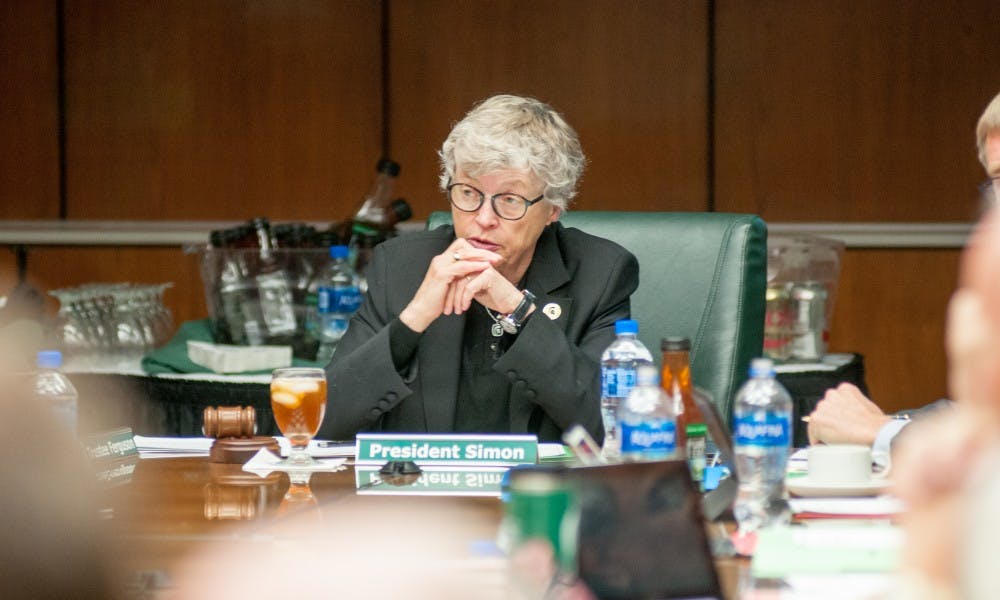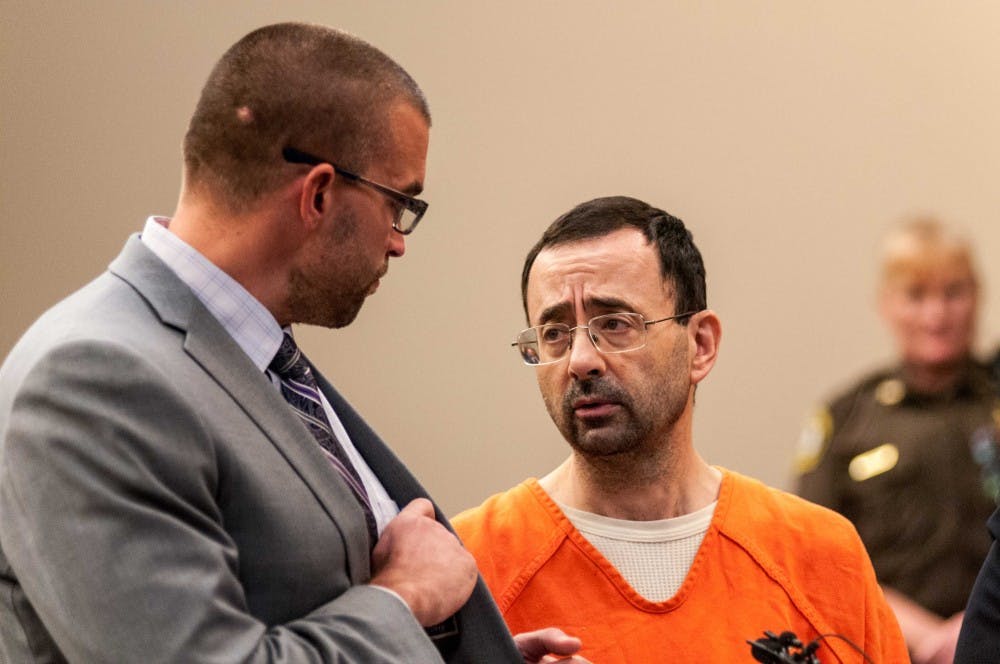Throughout the past semester, MSU has been the topic of many important stories.
Here is a look at some of the biggest stories of the semester.

Former MSU President Lou Anna K. Simon is pictured during the Board of Trustees meeting on Oct. 27, 2017 at the Hannah Administration Building. Simon resigned from her position in January 2018.
Throughout the past semester, MSU has been the topic of many important stories.
Here is a look at some of the biggest stories of the semester.
Richard Spencer's lawsuit
A National Policy Institute member sued MSU President Lou Anna K. Simon for denying request for Richard Spencer to speak on campus.
Cameron Padgett, an organizer for NPI filed a request on Sept. 3 to rent space at MSU to host NPI Director Richard Spencer following the violent events that transpired at his University of Virginia speech in Charlottesville, which culminated in the death of counter protester Heather Heyer.
Simon denied the request citing security concerns, which prompted Padgett to bring a lawsuit against Simon and the MSU board of trustees for free speech violations. He cited a case involving Auburn University which was decided in favor of the National Policy Institute. The board of trustees was eventually dropped from the lawsuit, but the case against Simon remains.
None of Simon's lawyers were able to comment on the case at this time because the matter is now in civil litigation, and MSU Spokesman Jason Cody declined to comment.
Attorney Kyle Bristow, who represents the National Policy Institute declined an interview but offered one comment.
"I'll let the pleadings speak for themselves," he said when asked where he saw the case heading in the future.
MSU law associate professor Nancy Castello offered insight into how the trial might play out.
“I think there’s a chance that he could win," Castello said. "He is trying to speak on a college campus, which traditionally has been a public forum that has very much protected speech under the first amendment.”
Castello said Spencer is probably aware of the rich history of college campuses respecting free speech, particularly in the instances of anti-Vietnam War protests during the 1960s and 1970s.
“So, we have a tradition of controversial speech being performed on college campuses," Castello said. "That’s probably what Richard Spencer’s relying on. On the other hand, if speech could be seen as either incitement speech or fighting words ... if it’s incitement speech or fighting words, the government can shut it down without penalty.”
Castello said incitement speech usually takes place in the moment, so it would be difficult to argue in court that Spencer will engage in it prior to his speech. She did note if a speaker riles a mob of people up to the point of violence, it counts as incitement speech.
“Incitement speech is like shouting, ‘Fire!’ in a crowded theater when there isn’t a fire and knowing that you could incite kind of a riot of people trying to run out, and in so doing, people could get harmed," Castello said.
Castello also explained the definition of fighting words, which she said is when one invites another person to a brawl.
“Say I am really angry at the George Bush administration for invading Iraq," Castello said. "And I started lighting the flag on fire and somebody stepped up and said, ‘Hey Professor Castello, I’m a military vet and I really respect the flag … you can’t light that flag on fire,’ and I say, ‘Yes, I can….You don’t like it? You come down here and show me how much you don’t like it!’ ... those are called fighting words.”
East Lansing City Council Election
The East Lansing City Council election on Nov. 7 saw the re-election of councilmember Ruth Beier and the election of MSU political science senior Aaron Stephens.
Stephens commented on his perspective as a student and a council member.
Support student media! Please consider donating to The State News and help fund the future of journalism.
“It’s a really good perspective to have because there’s just things I understand about how the university is operated because I’ve worked with the administration on a number of things, and you know, I’m in classes," Stephens said. "So, I hear from the professors. I hear from the other students and the student government on the issues that are facing them.”
It also saw the failure of the East Lansing Income Tax, which was intended to help aid in solving the city's debt problem. Instead, services to the community will likely be cut to compensate for the lack of funds. Stephens said a strategic planning session to discuss this will be open to the public on Dec. 10.
“We’re going to basically be doing — and I think this is the right approach — we’re going to be addressing what our priorities as a council are," Stephens said. "So, what we want to see out of the city, and what’s most important to us, and then work from there to kind of blank slate, recreate a budget based on those priorities.”
Stephens also reflected on his experience running for city council as a student and the biggest lessons he learned.
“The most valuable thing a public servant can do is listen," Stephens said. "Listen to the people that they serve, listen to the people that are adamantly against them, listen to the people that are adamantly for them. Listen to the people that don’t care, and why they don’t care.”
Since taking office, Stephens said he has become immersed in learning about the city's operations and how to remedy the debt.
“There’s a steep learning curve, definitely, but I’ve been in office for a couple of weeks now, and I’m learning a lot more about how our city operates, where we’re spending our money, what is in the budget, how we got in this situation in the first place, and I definitely want to explore options with Michigan State University, but there are hundreds of ideas being thrown around," Stephens said.
Larry Nassar pleads guilty
Former MSU and USA Gymnastics doctor Larry Nassar pleaded guilty in November to possessing child pornography and to seven counts of criminal sexual misconduct in Ingham County, as well as three counts in Eaton County.
He has agreed to a plea deal in Eaton County in which he pleaded guilty to three charges and to a minimum sentence of 25-40 years and a maximum sentence of life in prison, depending on what the court decides.
In return, Eaton County will drop four of the 13 counts he was charged with and reduce the other six of which he did not plead guilty.
He was first arrested by the FBI in December 2016 for the possession of "at least 37,000" images of child pornography.
Nassar is accused of sexually assaulting 140 girls and women through local and national gymnastics communities by using medical treatment as a ruse.
Attorney Stephen Drew Jr. represents 125 women accusing Nassar of sexual assault who will have the chance to speak, if they so choose to, at Nassar's Jan. 31, 2018, sentencing.
As part of the Eaton County plea deal, Nassar will not be charged for four additional images of child pornography that were not found in the federal investigation were dropped. Drew said these images are part of his team's argument that MSU could have discovered the images at an earlier date if they had taken action.

“One of our positions is in 2014, Michigan State clearly could have gotten, and should have gotten, and was indifferent to getting his computer at that time," Drew said. "If they’d taken his computer at that time and looked at it, they very well may have found some of the terrible things ... I’m not going to repeat them, but they’re vile.”
Drew acknowledged his clients' desires to see Nassar found guilty.
“Another part of the deal was that he’ll be on the Registered Sex Offender’s List, but our clients hope he never sees the light of day," Drew said.
MSU undergoes external Title IX review
In the wake of incidents such as the case of Larry Nassar, MSU commissioned an independent review of its Title IX accordance.
Law firm Husch Blackwell is responsible for the review. The first part of the firm's report is available now, and it found MSU in compliance with Title IX, but recommended that MSU reconsider its mandatory reporting policy.
"We are concerned that MSU’s policy requiring all responsible employees to not only notify the Title IX Coordinator of sexual misconduct of which they become aware, but to also notify law enforcement may be in tension with applicable legal requirements that vest victims with agency concerning whether to notify law enforcement," the report stated.
In an e-mail exchange, Title IX Director Jessica Norris said the university will begin to work on short-term changes to its policy.
"In response to the recently released Husch Blackwell report, MSU will be reviewing the Relationship Violence and Sexual Misconduct Policy to identify improvements that can be made to the policy in short-term," Norris wrote.
Norris wrote she looks forward to the second phase of the review, which she hopes will bring more ideas for improvement.
"We look forward to beginning phase two of the Title IX external review, which will focus on the support services, prevention and education programs, and awareness and outreach components of our Title IX program," Norris wrote. "The review will further our efforts to develop leading-edge policies, programs, and services that support the needs of the campus community."